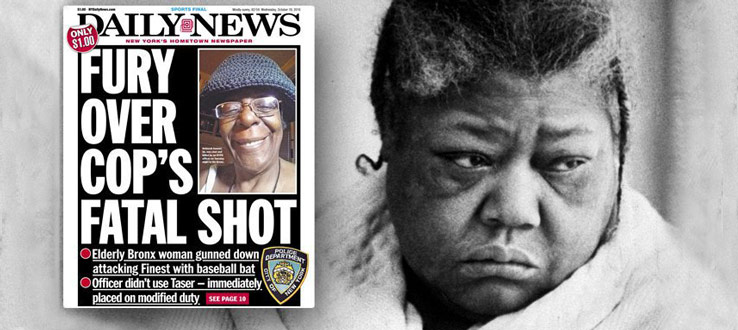Beyond the Shooting: Eleanor Gray Bumpurs, Identity Politics, and Community Activism
A lecture by Dr. Lashawn Harris.
Date: Tuesday, March 5, 2019
Time: 2:15–3:30 p.m.
Location: Occidental Lounge, Student Center, Brooklyn College
On October 29, 1984, 60-something-year-old Bronx, New York, resident Eleanor Bumpurs was fatally shot by New York Police Department (NYPD) officer Stephen Sullivan after a botched housing eviction. Bumpurs' killing, part of what many New York activists viewed as a continuation of police violence against racial and ethnic minorities, sparked local and national outrage, resulting in the pursuit of legal justice for Bumpurs. The Bumpurs killing and the subsequent jury indictment and acquittal of Officer Sullivan are well known to the public. But somewhat loss in the courageous fight for legal justice for the mother of seven and grandmother of 10 was her identity. Buried under a sea of anti-police brutality placards, lost in the chants of "No Justice No Peace," and visually confined to a somber looking 1981 photograph—that is how many, particularly New Yorkers, remember Bumpurs. This presentation departs from historical, sociological, and legal studies that primarily focus on Bumpurs' killing and the legal aftermath. Instead, this presentation, using a variety of primary sources including newspapers, photographic images, oral history, legal documents, city records, personal papers, radio interviews, and vital statistics, goes beyond the manner in which Bumpurs died. It reconstructs Bumpurs' life prior to her death, situating her within early 20th-century Jim Crow North Carolina and post–World War II New York City and offers snapshots of her life. Bumpurs' pre-shooting life uncovers her hopes, fears, and visions for herself and family, her familial relationships, and her determination to survive in rigidly constructed systems of race, gender, and class oppression.
LaShawn Harris
LaShawn Harris is an associate professor of history at Michigan State University. Her area of expertise is 20th-century United States and African American histories. Harris' scholarly articles have appeared in The Journal of African American History, Journal of Social History, Journal of Urban History, and SOULS. In 2014, she appeared on TV-One's nationally syndicated show Celebrity Crime File, a popular investigative series that highlights high-profile criminal cases of the 20th and 21st centuries. Her first monograph, Sex Workers, Psychics, and Number Runners: Black Women in New York City’s Underground Economy, published by the University of Illinois Press in 2016, won an Organization of American Historian award for best book in African American women's history, and the Philip Taft Labor Prize in Labor and Working-Class History. Her current projects explores the socioeconomic, political, and cultural lives of black New Yorkers during the 1980s.







